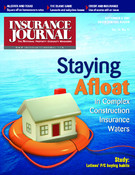Bad Faith
Pickett v. Texas Mut. Ins. Co.
Tex.App., Austin, July 26, 2007
Requirement that insured exhaust workers” compensation administrative procedures prior to bad faith suit sustains constitutional challenge.
Insured argued that the requirement that insured must exhaust administrative procedures set forth by the Texas Workers’ Compensation Commission prior to filing a suit seeking damages for carrier’s alleged bad faith delay or denial of benefits violated due process under the Constitution.
The court held that the requirement, which provides automatic access to the Commission’s resolution procedures and subsequent access to the courts if the Commission finds in favor of insured, does not deprive insured of the opportunity to be heard at a meaningful time in a meaningful manner and, therefore, does not violate constitutional rights.
Exclusions
Williams Consolidated I, Ltd. v. TIG Ins. Co.
Tex.App., Houston, July 31, 2007
Policy exclusion only precludes coverage for actual damage that began prior to policy period.
Homeowners sued insured subcontractor alleging that during the construction of their home faulty workmanship caused moisture to condense on and within the cavity of their home’s walls which led to mold and mildew growth.
The court held that the subcontractor’s policy exclusion for property damage, which has first occurred or begun prior to the effective dates of the policy, precluded coverage for any actual damage that had occurred or begun prior to the policy’s inception, but would not preclude coverage if it were merely the alleged process leading to the ultimate injury or damage which began before the policy’s inception.
Tanner v. Nationwide Mut. Ins. Co.
Tex. App., 11th Dist., August 9, 2007
Intentional acts exclusion precludes coverage for personal injury claims against insured arising from insured’s flight from police.
While fleeing the police, the insured struck claimants’ vehicle injuring claimants.
The insurer maintained that its policy’s exclusion for intentional acts precluded coverage for the claimants’ action.
The appellate court reasoned that insured’s desire to flee cops did not necessarily include a subjective intent to cause injury; however, the exclusion applied since the insured’s conduct made such an accident substantially likely to occur.
Homeowners/Property Insurance
Amine v. Liberty Lloyds of Texas Ins. Co.
Tex. App., 1st Dist., August 9, 2007
Insurer’s delay in payment pursuant to appraisal process does not implicate Texas late payment statute.
Insured homeowners filed five claims for damage to their home caused by water leaks. The insured invoked the appraisal clause of the policy, which provided that an umpire would be appointed in the event that insurer’s and insured’s appraisers could not agree on the amount of damage.
After appraisal, appraisers could not agree; therefore, an umpire issued an award for $98,400 for the cost of repair and $26,000 for the cost to replace personal property. The insurer timely paid $124,400.
Insured filed suit alleging that $124,400 was the umpire’s award on each of the five claims, and that insurer owed five times $98,400 plus five times $26,000. The insured also argued that the insurer violated Texas Ins. Code §21.55, which provides that if an insurer delays payment of a claim for more than 60 days after receipt of verification of claim, the insurer is liable for damages, attorneys fees and 18 percent interest on delayed payment.
The court held that payment of an appraisal award does not constitute the requisite finding of liability on part of insurer, and that Texas Ins. Code §21.55 therefore does not apply to a delay in payment pursuant to the appraisal process.
Johnson v. Laney IV
La.App., 4th Cir., July 25, 2007
Insurance proceeds payable to testamentary usufruct.
Decedent bequeathed to plaintiff the usufruct (i.e., right to use and enjoyment of to the exclusion of the underlying real owner) of a home, and bequeathed ownership of the home to a trust. The insured home sustained damage as a result of Hurricane Katrina.
The court held that, pursuant to La. CC. Art. 617, the insurance proceeds were exclusively payable to the plaintiff usufruct since the real owner did not separately insure its interest.
Occurrence
Federal Ins. Co. v. State Thomas, L.P.
Tex.App., Dallas, July 30, 2007
Mold damage to apartment complex caused by faulty construction held to be single “occurrence.”
Insured sought coverage for mold damage to apartment complex it owned and was building. The evidence demonstrated that improperly spaced ties in the stone walls, defective flat roofs, improperly waterproofed balconies and uncaulked joints resulted in rainwater intruding into the walls producing mold in the walls and in the apartments. There was damage to several buildings in the apartment complex.
The court held that the damage arose from a “single occurrence,” since there was evidence of only one cause for all the mold damage. Thus, the policy limits applicable to damage arising from “any one occurrence” applied.
The information for Case Watch is provided by the law firm of Goldberg Segalla LLP (www.goldbergsegalla.com). Editors are Richard J. Cohen, Daniel W. Gerber and Sarah J. Delaney.
Was this article valuable?
Here are more articles you may enjoy.


 What Analysts Are Saying About the 2026 P/C Insurance Market
What Analysts Are Saying About the 2026 P/C Insurance Market  Q4 Global Commercial Insurance Rates Drop 4%, in 6th Quarterly Decline: Marsh
Q4 Global Commercial Insurance Rates Drop 4%, in 6th Quarterly Decline: Marsh  Winter Storm Fern to Cause Up to $6.7B in Insured Losses
Winter Storm Fern to Cause Up to $6.7B in Insured Losses  Maine Plane Crash Victims Worked for Luxury Travel Startup Led by Texas Lawyer
Maine Plane Crash Victims Worked for Luxury Travel Startup Led by Texas Lawyer 


